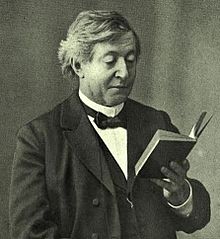Theodor Zahn
Theodor Zahn , from 1907 Ritter von Zahn , (born October 10, 1838 in Moers , † March 5, 1933 in Erlangen ) was a German Protestant theologian .
For many years he was professor for the New Testament at the University of Erlangen . As a New Testament scientist, Zahn did intensive research in the field of patristics . His main focus was on the origin and development of the New Testament canon .
Life
Theodor Zahn was born in 1838 as the eighth of ten children of the Protestant pedagogue Franz Ludwig Zahn (1798–1890) and his wife Anna, née. Schlatter (1800–1853) was born in Moers. He was the brother of Johannes Zahn and Franz Michael Zahn .
In 1836 his father founded a private school on his Fild estate near Moers, where Theodor Zahn also studied. He passed his Abitur in Cologne in 1854 . He studied Protestant theology in Basel , Erlangen and Berlin . In Erlangen he became a member of the Erlangen Wingolf in 1856 .
From 1858 he taught at various schools and high schools. In 1868, after completing his habilitation, he became a private lecturer for the New Testament in Göttingen , and three years later he was appointed associate professor . In 1877, Zahn received a call to the University of Kiel . A year later he moved to Erlangen. In 1888, Zahn received an appointment from both the University of Greifswald and the University of Leipzig , chose Leipzig and taught there until 1892, before returning to Erlangen and taking over the chair for Introduction and Exegesis of the New Testament.
In 1913 he was elected a foreign member of the Göttingen Academy of Sciences .
Theological work
As a proven expert in the fields of the New Testament and Patristics, Zahn was closely involved in the then current discussion about the question of the origin of the Gospels . His theological work was characterized by detailed philological analyzes and a strict conservatism in theological questions. In this sense he was seen as a counterpart to historical-critical research and its representatives, but was nevertheless on friendly terms with Adolf Harnack, for example .
Theodor Zahn pleaded widely for a rather early date when the Gospels were written. Contrary to the zeitgeist of the time, he considered the Gospel of John to be a uniform work that the apostle John himself wrote. According to Zahn, the New Testament canon was laid down in the middle of the second century.
From 1894 to 1933, Zahn was co-editor of the Neue Kirchliche Zeitschrift and, as such, was also responsible for the publication of research on the history of the New Testament canon and early Christian literature .
Honors
- In 1907 Zahn was raised to the nobility (knight of) after various other honors; In 1910 the city of Erlangen granted him honorary citizenship .
- Theodor-von-Zahn-Straße in Erlangen is named after him.
Fonts (selection)
- Ignatius of Antioch (1873).
- Introduction to the New Testament . Brockhaus, Wuppertal 1994, ISBN 3-417-29218-2 (reprint of the Leipzig 1907 edition).
- Outline of the History of the Apostolic Age. Deichert, second edition Leipzig 1904.
- Outline of the story of the life of Jesus . Hänssler, Holzgerlingen 1999, ISBN 3-7751-3274-0 (reprint of the Leipzig 1928 edition).
- Outline of the history of the New Testament canon . Brockhaus, Wuppertal 1985, ISBN 3-417-29235-2 (reprint of the Leipzig 1904 edition).
- The Historian and His Material in the New Testament - Article in Journal for Church Science and Life No. 9, 1888, pp. 581-596.
- The Adoration of Jesus in the Age of the Apostles A. Deichert'sche Buchhandlung, Leipzig, 1910.
- Introduction to the New Testament - Volume One A. Deichert'sche Buchhandlung Nachf. Georg Böhme, Leipzig, 1897.
- Introduction to the New Testament - Volume Two A. Deichert'sche Buchhandlung Nachf. Georg Böhme, Leipzig, 1899.
- Slavery and Christianity in the Old World at Carl Winter's University Bookstore , Heidelberg, 1879.
literature
- Wolfram Kinzig : Zahn, Theodor v. In: Lexicon for Theology and Church . 3rd edition, Volume 10, Col. 1374-1375.
- Uwe Swarat: Old Church and New Testament: Theodor Zahn as patristic. Brockhaus, Wuppertal and Zurich 1991, ISBN 3-417-29342-1 .
- Klaus-Gunther Wesseling : Zahn, Theodor. In: Biographisch-Bibliographisches Kirchenlexikon (BBKL). Volume 14, Bautz, Herzberg 1998, ISBN 3-88309-073-5 , Sp. 321-333.
Individual evidence
- ↑ Tooth family tree
- ↑ Landschaftsverband Rheinland - Portal Rheinische Geschichte - Franz Ludwig Zahn - page accessed on July 2, 2011
- ↑ Holger Krahnke: The members of the Academy of Sciences in Göttingen 1751-2001 (= Treatises of the Academy of Sciences in Göttingen, Philological-Historical Class. Volume 3, Vol. 246 = Treatises of the Academy of Sciences in Göttingen, Mathematical-Physical Class. Episode 3, vol. 50). Vandenhoeck & Ruprecht, Göttingen 2001, ISBN 3-525-82516-1 , p. 265.
Web links
- Literature by and about Theodor Zahn in the catalog of the German National Library
- 43 works at archive.org (partly wrong title at NT-Kom.!)
- Commentary on the New Testament in Dr. BA Zuiddam's Tasmanian study.
- Overview of Theodor Zahn's courses at the University of Leipzig (winter semester 1888 to winter semester 1891)
| personal data | |
|---|---|
| SURNAME | Zahn, Theodor |
| ALTERNATIVE NAMES | Zahn, Theodor Ritter von (full name); Zahn, Theodor von |
| BRIEF DESCRIPTION | German Protestant theologian |
| DATE OF BIRTH | October 10, 1838 |
| PLACE OF BIRTH | Moers |
| DATE OF DEATH | March 5, 1933 |
| Place of death | gain |
